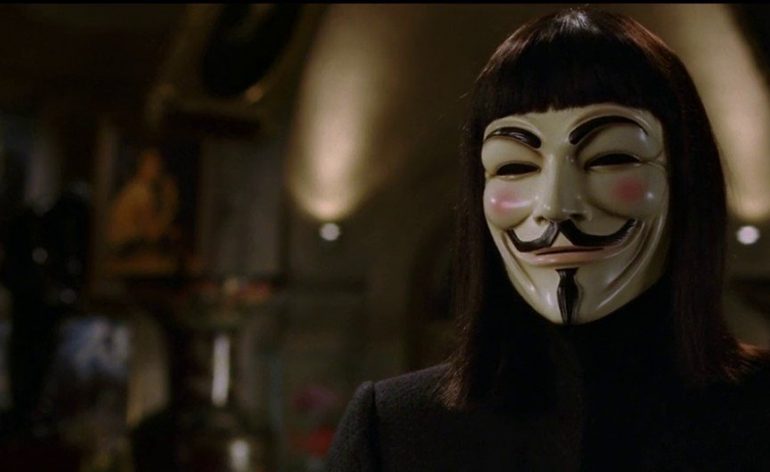V for Vendetta: the Once and Future 1984
In 1985, author Neil Postman released Amusing Ourselves to Death, a treaty on political discourse in the mass media age. Postman argued that George Orwell’s vision of the future was less prescient than his contemporary, Aldous Huxley. Postman argued that the future envisioned in Brave New World, with its drugs, sex and triviality, was closer to our current reality than the harsh regime of 1984. It’s no surprise that comic mastermind Alan Moore drew from both Orwell and Huxley for his work V for Vendetta. After all, why spend time arguing which future is worse when both combined is even more terrifying?
V for Vendetta has meant different things to different people in the years since it first appeared in graphic form. In the beginning, Moore envisioned it as an allegory of the Thatcher government, followed to its logical (for Moore) and terrifying conclusion. Upon the release of the 2005 film adaptation it became something else: a warning cry against George W. Bush’s politics. In the years that followed, the group Anonymous co-opted the film’s most visible symbol: the stylized Guy Fawkes mask. Various protest organizations have also adopted the mask, from members of the Arab Spring to the Occupy Wall Street movement.
And today? I re-watched V for Vendetta a few weeks ago, intending to write an article in time for Guy Fawkes Night. Now that we’re two weeks past my original deadline; however, I’m coming to write a different sort of article. In between then and now, the United States elected Donald Trump as our 45th president. All of a sudden, movies and films containing dystopian warnings become urgently relevant.
V for Vendetta takes place in the not-too-distant future, at a time when much of the world is in turmoil. The United States is a shell of its former self, while the United Kingdom is ruled by autocratic Norsefire government. Lead by High Chancellor Adam Sutler (John Hurt), the Norsefire party controls every aspect of people’s lives, from their television to the times they’re allowed outside. It’s in this world that Evey Hammond (Natalie Portman) is trying to survive. When the movie opens, things aren’t going too well for Evey. While out past curfew, she’s cornered by the secret police and nearly raped. Her life is spared when vigilante V (Hugo Weaving) comes to her aid.
V is also trying to survive in this brave new world, although in quite a different manner. V has a plan to overthrow the government. He tries to enlist Evey in his schemes, although she’s reluctant to become a true outlaw. After she escapes V’s hideout; however, things don’t improve for her. After her boss is arrested for insulting the state, Evey herself is sent to prison, to repudiate V and turn in this enemy of the state. V’s plans will hinge on whether or not Evey gives him up to the secret police.
Alan Moore has repeatedly disavowed his movies, which I find a little hypocritical, considering how liberally he borrows from public domain figures such as Fawkes, Alice (in Lost Girls), or Dr. Jeckyll as seen in The League of Extraordinary Gentlemen). You’d think someone who adopted characters and storylines to fit his vision would be more sympathetic for others who wanted to adapt his works to a different medium. But despite Moore’s protests, V for Vendetta works as a timeless allegory, eclipsing his original vision as an anti-Thatcher manifesto.
Much has been made on Twitter these past two weeks about Donald Trump’s incoming presidency and what it means for America’s freedoms and traditions. Countless books and movies have shown us how well-meaning nations can end up on a slippery slope to demagoguery. Historic events also inform us, if we’re willing to listen. It’s not a cliché to point out how much easier it is to tear down than build up. Nor is it hyperbolic to point out that the fascism that once gripped much of Europe could very much happen here.
To fight, we must listen to the voices of the past. Study historic events. Read dystopian fiction. Engage with rebellious films. Embrace the iconography of those who fight tyranny. Or, we can do as Huxley feared. We can sit back and make a meme on our shiny new iPhones before snuggling in between our cool Egyptian cotton sheets. But as V might caution, the choice not to act is in itself a political decision. We might not fight, but neither should we stand in the way of those that do.
V for Vendetta tl;drs
Quick summary: In the near future, the United Kingdom is run by a neo-fascist regime. While ordinary people try to live their lives under oppression, one man (the titular V) is on a mission to bring down the system.
Too many writers? With Alan Moore refusing credit, the number of named writers is three: the Wachowskis and David Lloyd.
Recommended if you like: Better adaptations of Alan Moore’s work, rebelling against the system, alliteration
Better than I expected? The movie looks like it could have been produced yesterday.
Should it be rebooted? No. One adaptation of the graphic novel is enough.
Verdict: As vital now as it has been since its publication, V for Vendetta depicts what it takes to break the system, once the system no longer serves the people.
Related Reading: Wiki article





